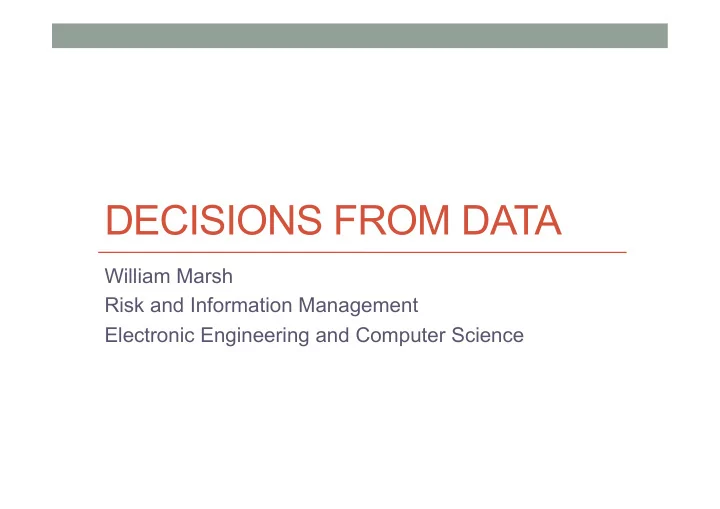

DECISIONS FROM DATA William Marsh Risk and Information Management Electronic Engineering and Computer Science
Case Study: Mangled Extremities • Academic Trauma Unit at the RLH • Amputation vs. Salvage • Complex • Small amount of data
Clinical Evidence • Limits of RCT • Rare conditions • Ethical and legal issues • Costs • Generalisable? • Works some where vs. works every where • Background knowledge need • `Any belief that controlled trial is the only way would mean that the pendulum had swung too far but that it had come right off the hook.’ Bradford Hill, 1965
Scoring Systems • Low clinical acceptance • Borderline cases • Assumes historical decisions are perfect • Predicts the decision Output: Amputation! • Data on what doctors did • … versus what would happen to the patient for possible decisions New approach needed • Integrate evidence • Predict outcome
Bayesian Networks • Network of uncertain variables Infection=No Infection=Yes Fever=Yes 0.90 0.15 Fever=No 0.10 0.85 • Developed from: • Expert Knowledge • Data • Application to clinical problems • Expert systems – simulate the expert • Analyse the data – decisions based on evidence
Association, Causality & Interventions • Need for causal relations ??? • Interventions Outcomes • Association vs. Causation • Grey hair predicts heart disease • Colouring hair to reduce risk? • Identifying causes • Experiment (RCT) • Domain Knowledge + Observational Data
Mangled Extremity BN
Current Focus – Physiology BN • Models patient physiology • Predicts coagulopathy, and risk of death • Importance in making limb salvage decisions
Summary: Vision • Use causal Bayesian nets to • Integrate evidence: data, knowledge • Support decision making: estimate result of interventions • Represent the evidence available • Source of evidence: data, literature, expert consultation • Uncertainty • Use • Guidelines or individuals • Applicable where RCTs are impractical • Evidence for the necessity and potential benefits of a RCT
Acknowledgements • Trauma Academic Unit at BLH • Lt Col Nigel Tai, FRCS, Vascular surgery • Zane Perkins, Academic Research Fellow, PhD student • Risk and Information Management, EECS • Professor Norman Fenton, head of the research group • Professor Martin Neil • Dr Munevver Kokuer, research assistant • Barbaros Yet, PhD student • Nargis Pauran, PhD student
EXTRA SLIDES
Bayesian Learning and Hypothesis Testing • Limited data and abundance of domain knowledge about many clinical subjects. • Identifying variables and causal relations by domain knowledge. • Bayesian Learning. • Parameter Learning with Expert Priors. • Bayesian Hypothesis Testing.
Knowledge Synthesis from Models • Difficulties in using DSS models real-time in clinical practice. • Time (e.g. entering data). • Resources (e.g. handheld devices). • Using models to update clinical protocols. • Knowledge synthesis by BN models.
Recommend
More recommend